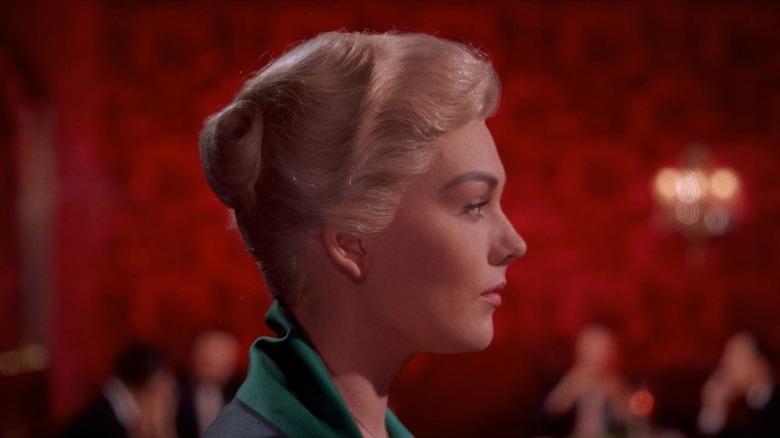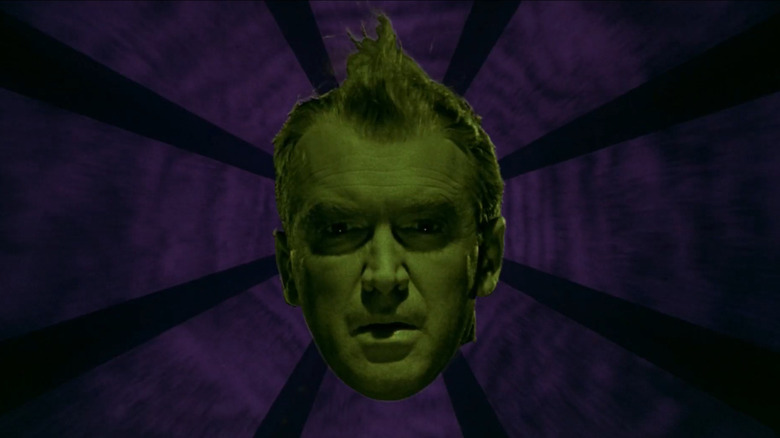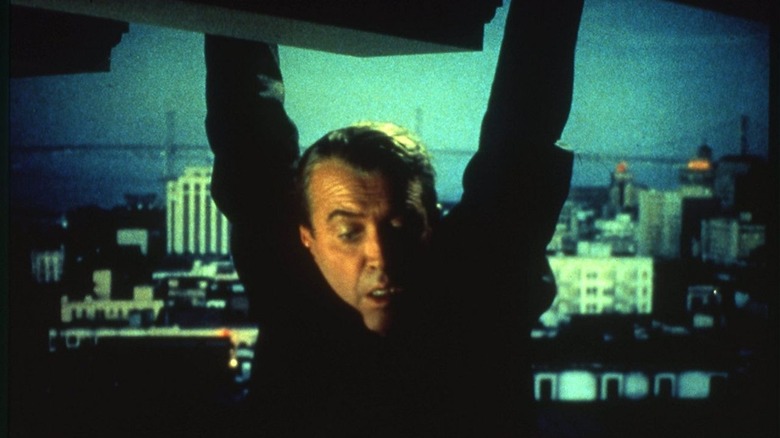Robert Downey Jr. Explains Why He's Thinking About Remaking Vertigo, And We're Confused
In March of 2023, Deadline announced that Paramount was interested in remaking Alfred Hitchcock's celebrated 1958 thriller "Vertigo" as a potential vehicle for Robert Downey, Jr. The script, adapted from the original by Alec Coppel and Samuel Taylor, would be written by Steven Knight, the writer of "Spencer" and "Serenity," and who was the creator of the hit TV series "Peaky Blinders." Downey would play Scottie Ferguson, the role played by James Stewart in the original. There was no word as to who might play the mysterious Madeleine Elster, the role played by Kim Novak.
"Vertigo" is about a former cop, Scottie, who is asked by a friend to follow his wife, Madeleine. It seems that Madeleine has become obsessed with a painting in the local art museum, and may begin to think that she is mysteriously transforming into the woman in the portrait. In following Madeleine, Scottie is able to save her from a suicide attempt, and the two begin to form an intense, eerie romance. There is a twist halfway through "Vertigo" that I dare not spoil for the few who may not have seen it.
"Vertigo" is often considered one of the best movies of all time, and even topped the famous Sight & Sound poll in 2012, beating out the long-standing champion "Citizen Kane" (although it was supplanted in 2022 by Chantal Akerman's 1975 film "Jeanne Dielman, 23 Quai du Commerce, 1080 Bruxelles").
The phrase "Vertigo remake," however, will likely have some wincing, notably those who remember Gus Van Sant's ill-advised 1998 remake of Hitchcock's "Psycho." Why remake "Vertigo"?Downey answered that question plainly in a recent interview with the New York Times Magazine. The actor is a rock-climbing enthusiast, and explaining a "Vertigo" remake seems to come from his hobby. Why? Because it's there.
'I think we can do better.'
At first, Downey was flip, joking that "Vertigo" can be outdone with the right team on the case. And some might agree with him; while many critics adore "Vertigo," and it often appears in film school syllabi, some find its storytelling to be arch, distant, and cold. It also contains many scenes of a crazed Scottie reshaping a female character to his own specifications, insisting she dress and behave a certain way, highlighting a streak of sexism from a filmmaker who can barely camouflage his fetishes. He may have affected a flip tone — something Downey is quite adept at doing — but the actor might have struck on a note of sincerity. When asked why he would remake "Vertigo," Downey said:
"Not even risky. Advisably ridiculous to even consider. Great, let's look into it! First of all, who would our partners be in it? Love them, respect them. Second of all, let me reread the original synopsis. I think we can do better."
The title of "Vertigo" comes from the condition that afflicts Scottie after he nearly fell off a building during a rooftop foot chase back in his beat-cop days. He is now terrified by heights and becomes nervous and dizzy when he looks down from even a stepladder. To envision the vertigo, Hitchcock famously employed an "elongating" shot wherein he would zoom the camera in while moving it backward at the same time, creating a strange "plunging" visual.
Downey, as mentioned above, loves to rock-climb, and has had several moments similar to Scottie's wherein it seemed like he might fall from a great height. If there's anyone who knows what it's like to constantly stare gravity in the face, it's a rock climber.
A rock-climbers vertigo
Downy parlayed that experience to a moment on a cliff face, and he ... well, he seemed to compare the risk of remaking a classic movie to the physical risk of climbing. He said:
"I have been rock climbing before and gotten stuck in that panic freeze, and if not for the sheer embarrassment, I would have asked to have been hoisted off that rock. I lost my confidence in my positioning, the drop was too far, my body reacted. It wasn't fight-or-flight; it was freeze-and-about-to-faint. I'll never forget it, and it made me think there are cinematic devices that have yet to be fully utilized that I think would provide an experience in trying to say, 'What does it feel like to be psychologically silly with fear over something that should be manageable?'"
He then added, affably: "That might be entertaining."
In brief, Downey seems to want to remake "Vertigo" for the vertigo moments. The psychological study, the semi-supernatural underpinnings, and Hitchcock's fetishism didn't seem to enter the conversation. Downey merely wants to recreate the sensation of almost falling.
A few recent films have already captured that experience to a terrifying degree. A recent survival movie called "Fall" saw two characters stuck at the top of a 2,000 radio tower out in the middle of the desert, likely triggering a fear response in the audience's acrophobes. In 2015, Robert Zemeckis made a movie called "The Walk," a biography of Philippe Petit, the acrobat who once walked a high wire in between the World Trade Center towers. Using state-of-the-art effects and deep, deep 3-D photography, Zemeckis expertly approximated the experience of looking straight down for 1,362 feet.
"Vertigo," Downey seems to feel, should also capture that experience.


